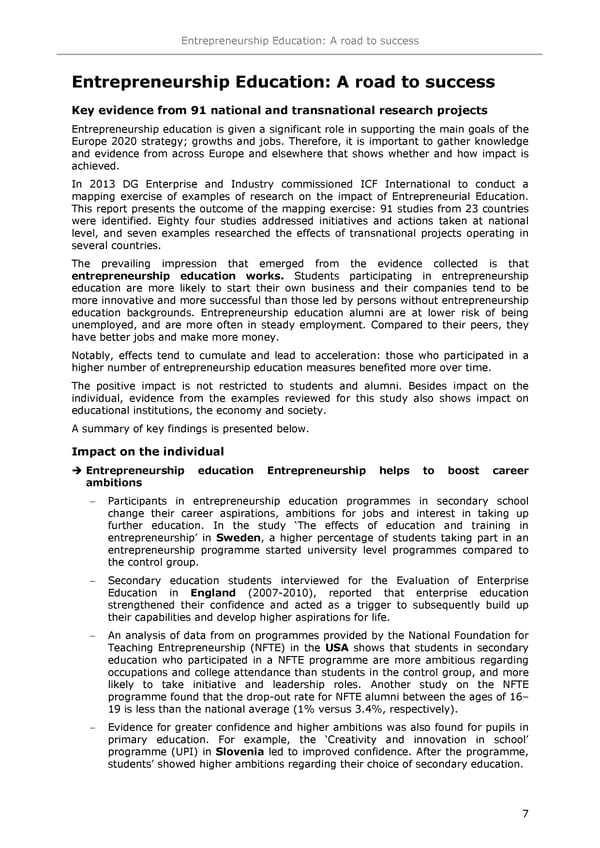Entrepreneurship Education: A road to success Entrepreneurship Education: A road to success Key evidence from 91 national and transnational research projects Entrepreneurship education is given a significant role in supporting the main goals of the Europe 2020 strategy; growths and jobs. Therefore, it is important to gather knowledge and evidence from across Europe and elsewhere that shows whether and how impact is achieved. In 2013 DG Enterprise and Industry commissioned ICF International to conduct a mapping exercise of examples of research on the impact of Entrepreneurial Education. This report presents the outcome of the mapping exercise: 91 studies from 23 countries were identified. Eighty four studies addressed initiatives and actions taken at national level, and seven examples researched the effects of transnational projects operating in several countries. The prevailing impression that emerged from the evidence collected is that entrepreneurship education works. Students participating in entrepreneurship education are more likely to start their own business and their companies tend to be more innovative and more successful than those led by persons without entrepreneurship education backgrounds. Entrepreneurship education alumni are at lower risk of being unemployed, and are more often in steady employment. Compared to their peers, they have better jobs and make more money. Notably, effects tend to cumulate and lead to acceleration: those who participated in a higher number of entrepreneurship education measures benefited more over time. The positive impact is not restricted to students and alumni. Besides impact on the individual, evidence from the examples reviewed for this study also shows impact on educational institutions, the economy and society. A summary of key findings is presented below. Impact on the individual Entrepreneurship education Entrepreneurship helps to boost career ambitions Participants in entrepreneurship education programmes in secondary school change their career aspirations, ambitions for jobs and interest in taking up further education. In the study 8The effects of education and training in entrepreneurship9 in Sweden, a higher percentage of students taking part in an entrepreneurship programme started university level programmes compared to the control group. Secondary education students interviewed for the Evaluation of Enterprise Education in England (2007-2010), reported that enterprise education strengthened their confidence and acted as a trigger to subsequently build up their capabilities and develop higher aspirations for life. An analysis of data from on programmes provided by the National Foundation for Teaching Entrepreneurship (NFTE) in the USA shows that students in secondary education who participated in a NFTE programme are more ambitious regarding occupations and college attendance than students in the control group, and more likely to take initiative and leadership roles. Another study on the NFTE programme found that the drop-out rate for NFTE alumni between the ages of 163 19 is less than the national average (1% versus 3.4%, respectively). Evidence for greater confidence and higher ambitions was also found for pupils in primary education. For example, the 8Creativity and innovation in school9 programme (UPI) in Slovenia led to improved confidence. After the programme, students9 showed higher ambitions regarding their choice of secondary education. 7
 Entrepreneurship Education Page 10 Page 12
Entrepreneurship Education Page 10 Page 12